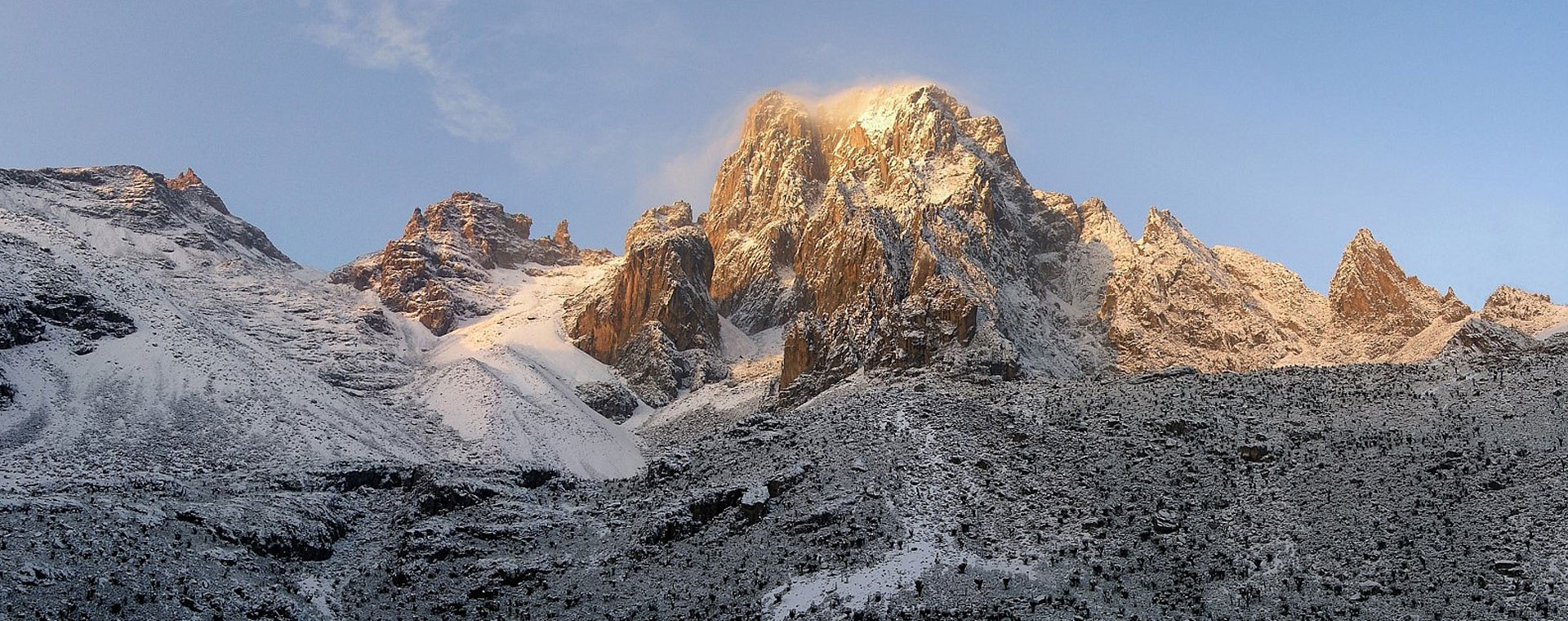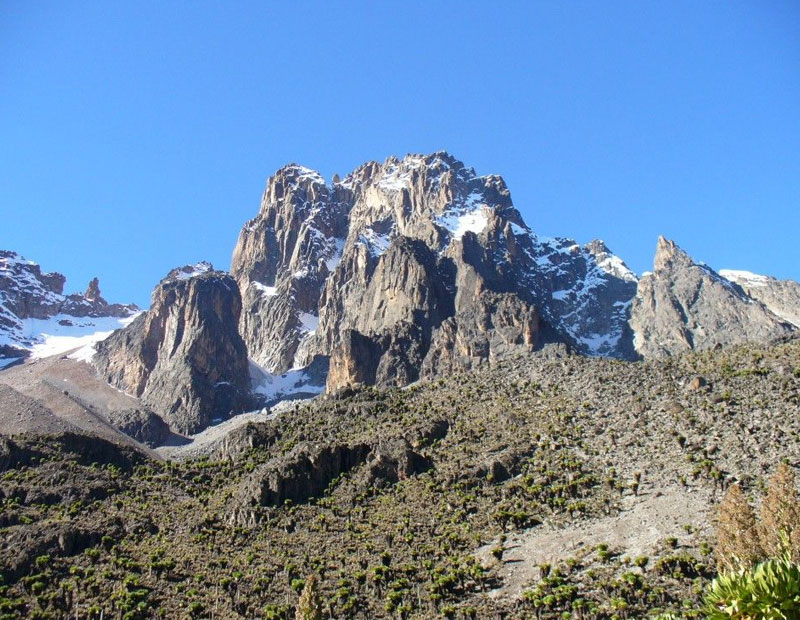
Reasonably gradual trekking in Mount Kenya to the summit, on which unless it is your preference you do not need to camp since there are, manned mountain hut positioned strategically at the overnight stops.

NB: Due to the unpredictability of weather around the Summit, we sometimes allow for an extra Summit day thus extending the climb.
What you need to know: You carry only a small bag with your personal effects while your backpack, sleeping bags, clothes, food, and kitchen gear are carried by porters. The group is guided by an experienced Mt. Kenya guide. Nights are spent in huts on the mountain and in small tents with foam mattresses in the foothills. Besides your normal effects, you are advised to bring a medium-sized backpack, sleeping bag, warm clothes, good hiking shoes, a nylon rain suit, a pair of sunglasses, and a sunblock.
What you need to know:You carry only a small bag with your personal effects while your back pack, sleeping bags, clothes, food and kitchen gear are carried by porters. The group is guided by an experienced Mt. Kenya guide. Nights are spent in huts on the mountain and in small tents with foam mattresses in the foothills. Besides your normal effects, you are advised to bring a medium sized back pack, sleeping bag, warm clothes, good hiking shoes, nylon rain suit, a pair of sunglasses and sun block.
What is included:Transport from Nairobi to your hotel and park gate, hotel on your first and last night, all food starting with evening meal on the first day and ending with breakfast on the last day, services of a mountain guide and porters, all hut fees, camping equipment, acclimatization tour to the equator.
Mt Kenya Kit List:This list covers equipment and clothing recommended for a Mt Kenya trek and safari. Your main bags will be carried by vehicles or porters. At all times you will only be walking with day-packs.
Day-pack:Large enough to carry spare clothes, waterproofs, camera, lunch, drink, etc.Your main bag should be a large kit bag or ideally a rucksack which is easier for porters to carry. This should weigh less than 16 kg for the Mt Kenya section. A light kit-bag is useful for storing any gear not needed on the mountain section.
Sleeping bag: A good 4 season bag. Temperatures can be minus 10 C high on Mt Kenya. A quality liner is useful for extra warmth, upgrading a 3 season to a 4 season bag. Full length zip useful for ventilation on warmer nights.
Sleeping mat:e.g. Karri mat or Thermarest non-slip.
Water bottle:1 litre, (1.5 litre if you need to drink a lot) Purifying tablets or iodine - juice drink powders to disguise the taste.
Torch:Spare bulbs, batteries. Head torch useful but not essential. Small spare torch.
Walking pole/s:Highly recommended by some, awkward for others - try one out first.
Camera: Plenty of film. Spare camera batteries and cleaning kit, dust proof camera bag. The following list of clothing is provided as a guideline only. But your clothing should allow you the flexibility to cope with the range of weather conditions you may encounter on this trip.
Clothing:underwear, light cotton/ polycotton for general wear, and insulating next-to-skin ("thermal") vest and long johns for the cold or wet days on the trek. Socks suitable for walking and general wear. T-shirts, long sleeved shirt, sweatshirt, trousers/skirt for general wear. Walking shirt. Warm pullover/jersey, warm fleece or down jacket. Walking trousers, skirt or breeches. Walking shorts. Track suit (for evenings in camp, and as an extra layer when cold). Thick jacket (fleece, fibre-pile, or pile and pertex mix). Waterproof and windproof jacket/cagoule and over trousers. Walking boots - well broken in. Thickish soled training shoes or light walking boots. Sandals/flip-flops. Gaiters for keeping out stones, seeds, scratches etc. Sunglasses, sun hat, (packable/collapsible), warm hat/balaclava, warm gloves, scarf, neckerchief, swimming costume.
Other kit:Towel, toilet kit, spare specs, and personal first aid kit (e.g. sticking plasters, lint, antiseptic cream, aspirins/paracetamol, antihistamine, malaria pills and any special personal medication). Sun cream, insect repellent, lip salve, wet wipes, sewing kit. Binoculars for bird/animal spotting, plant, bird and wildlife guides. A wristwatch with an alarm function is useful for early starts. Use strong plastic bags inside your rucksack to keep out rain and dust.
Documents: Passport, passport photocopy (main page only), travelers cheques, insurance certificate, etc all in a secure money belt/pouch. Wallet for day to day use. Diary, notebook. If you have spare items of clothing, boots, or kit you don’t use anymore, and some unused baggage allowance, please bring them specifically to give to our local members of staff (porters, guides, etc.) - they will be greatly appreciated. People often overlook this item only to regret it when they’re out in Africa and realize how useful their things would have been to the locals.
Diwaka Safaris works with your wish list, or offers obligation-free advice, on personally-curated safaris to fit your schedule, budget and desires.
Find Out MoreWe offer unique safaris in East Africa. Our team of proven professionals offer Family Holidays, Cultural Safaris, Eco Safaris, Bird watching Safaris, Beach Holidays, Honeymoon Holidays, Mountain Climbing and Trekking safaris,Camping safaris, photographic Safaris Groups and incentive tour packages, Car hire, Balloon safaris with a personal touch to meet the needs of each of our esteemed customer.
Vladimír Staňura – USA
We wanted to do safari with my wife in Kenya. Diwaka Safaris organized our trip for 17 days professionally. We were very satisfied with all services. The best part was our guide Patrick Waweru who did an excellent job.
josefkingley – USA
Decided to do one a early Jan before the corona nightmare...wasnt decided on the exact itinerary especially the accommodation to choose...did my own research and decided on the ones I could get though decided they can also advice on what they had in mind so that we could compare prices as well as I could get to check on their diff reviews...was a 4 nights trip just Naivasha where we stayed at Naivasha Sopa and Mara at Ashnil..loved ashnil way better cos of the views as well what we got to see the in terms of wildlife..